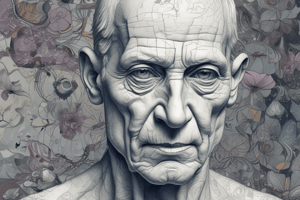Podcast
Questions and Answers
What is mental health primarily concerned with?
What is mental health primarily concerned with?
- Physical well-being
- Emotional, psychological, and social well-being (correct)
- Intellectual abilities
- Financial stability
Which type of mental disorder is characterized by excessive fear or anxiety?
Which type of mental disorder is characterized by excessive fear or anxiety?
- Anxiety Disorder (correct)
- Psychotic Disorder
- Personality Disorder
- Mood Disorder
What is a common symptom of depression?
What is a common symptom of depression?
- Improved concentration
- Increased energy
- Persistent feelings of sadness (correct)
- Euphoria
Which mental health condition is characterized by distorted perceptions of reality?
Which mental health condition is characterized by distorted perceptions of reality?
What is a risk factor for developing mental health conditions?
What is a risk factor for developing mental health conditions?
What is a common symptom of Post-Traumatic Stress Disorder (PTSD)?
What is a common symptom of Post-Traumatic Stress Disorder (PTSD)?
Which type of mental disorder is characterized by disturbances in eating behaviors?
Which type of mental disorder is characterized by disturbances in eating behaviors?
What is a characteristic of bipolar disorder?
What is a characteristic of bipolar disorder?
Flashcards are hidden until you start studying
Study Notes
Definition of Mental Health
- Mental health refers to the emotional, psychological, and social well-being of an individual
- It affects how we think, feel, and behave, and is important for our overall quality of life
Types of Mental Disorders
- Anxiety Disorders: excessive fear or anxiety, e.g. phobias, panic disorder, PTSD
- Mood Disorders: disturbances in mood, e.g. depression, bipolar disorder
- Personality Disorders: patterns of thought and behavior that impair relationships and daily life, e.g. borderline personality disorder
- Psychotic Disorders: distorted perceptions of reality, e.g. schizophrenia
- Trauma and Stressor-Related Disorders: reactions to traumatic events, e.g. acute stress disorder
- Dissociative Disorders: disconnection from thoughts, feelings, or experiences, e.g. dissociative identity disorder
- Eating Disorders: disturbances in eating behaviors, e.g. anorexia nervosa, bulimia nervosa
- Sleep Disorders: disturbances in sleep patterns, e.g. insomnia, sleep apnea
Common Mental Health Conditions
- Depression: persistent feelings of sadness, hopelessness, and loss of interest in activities
- Anxiety: excessive worry, fear, or anxiety that interferes with daily life
- Post-Traumatic Stress Disorder (PTSD): reactions to traumatic events, e.g. flashbacks, nightmares
- Bipolar Disorder: extreme mood swings, from manic highs to depressive lows
- Schizophrenia: distorted perceptions of reality, including hallucinations and delusions
Risk Factors and Causes
- Genetics: family history of mental health conditions
- Environmental: trauma, stress, social isolation
- Brain Chemistry: imbalance of neurotransmitters, e.g. serotonin, dopamine
- Lifestyle: poor sleep, exercise, and nutrition habits
Symptoms and Diagnosis
- Symptoms: changes in mood, behavior, or cognition that interfere with daily life
- Diagnosis: clinical evaluation by a mental health professional, using diagnostic criteria from the DSM-5
Treatment and Management
- Psychotherapy: talk therapy, e.g. cognitive-behavioral therapy (CBT), psychodynamic therapy
- Medications: prescribed by a mental health professional, e.g. antidepressants, antipsychotics
- Lifestyle Changes: healthy habits, e.g. regular exercise, balanced diet, adequate sleep
- Support Systems: social support from family, friends, and support groups
Definition of Mental Health
- Emotional, psychological, and social well-being of an individual affects overall quality of life
- Influences how we think, feel, and behave
Types of Mental Disorders
- Anxiety Disorders: characterized by excessive fear or anxiety, e.g. phobias, panic disorder, PTSD
- Mood Disorders: involve disturbances in mood, e.g. depression, bipolar disorder
- Personality Disorders: patterns of thought and behavior that impair relationships and daily life, e.g. borderline personality disorder
- Psychotic Disorders: distorted perceptions of reality, e.g. schizophrenia
- Trauma and Stressor-Related Disorders: reactions to traumatic events, e.g. acute stress disorder
- Dissociative Disorders: disconnection from thoughts, feelings, or experiences, e.g. dissociative identity disorder
- Eating Disorders: disturbances in eating behaviors, e.g. anorexia nervosa, bulimia nervosa
- Sleep Disorders: disturbances in sleep patterns, e.g. insomnia, sleep apnea
Common Mental Health Conditions
- Depression: persistent feelings of sadness, hopelessness, and loss of interest in activities
- Anxiety: excessive worry, fear, or anxiety that interferes with daily life
- Post-Traumatic Stress Disorder (PTSD): reactions to traumatic events, e.g. flashbacks, nightmares
- Bipolar Disorder: extreme mood swings, from manic highs to depressive lows
- Schizophrenia: distorted perceptions of reality, including hallucinations and delusions
Risk Factors and Causes
- Genetic predisposition: family history of mental health conditions
- Environmental factors: trauma, stress, social isolation
- Brain chemistry imbalance: neurotransmitter imbalance, e.g. serotonin, dopamine
- Unhealthy lifestyle habits: poor sleep, exercise, and nutrition habits
Symptoms and Diagnosis
- Symptoms: changes in mood, behavior, or cognition that interfere with daily life
- Diagnosis: clinical evaluation by a mental health professional using DSM-5 diagnostic criteria
Treatment and Management
- Psychotherapy: talk therapy, e.g. cognitive-behavioral therapy (CBT), psychodynamic therapy
- Medications: prescribed by a mental health professional, e.g. antidepressants, antipsychotics
- Lifestyle changes: healthy habits, e.g. regular exercise, balanced diet, adequate sleep
- Support systems: social support from family, friends, and support groups
Studying That Suits You
Use AI to generate personalized quizzes and flashcards to suit your learning preferences.




